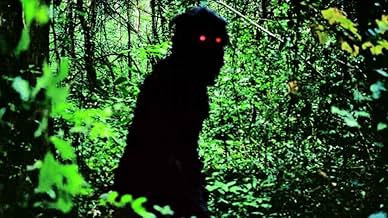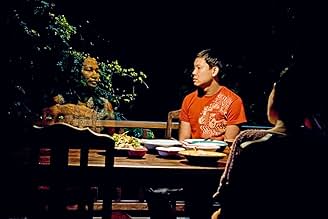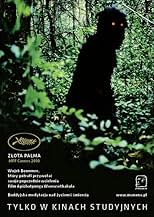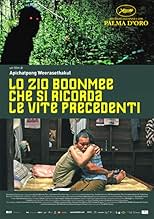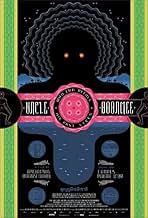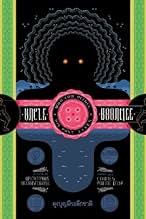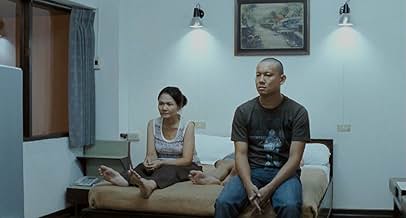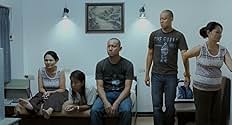Tio Boonmee, Que Pode Recordar Suas Vidas Passadas
Título original: Loong Boonmee raleuk chat
AVALIAÇÃO DA IMDb
6,7/10
18 mil
SUA AVALIAÇÃO
Ao morrer de doença renal, um homem passa seus últimos dias sombrios com a família, incluindo o fantasma de sua esposa e um espírito da floresta que costumava ser seu filho.Ao morrer de doença renal, um homem passa seus últimos dias sombrios com a família, incluindo o fantasma de sua esposa e um espírito da floresta que costumava ser seu filho.Ao morrer de doença renal, um homem passa seus últimos dias sombrios com a família, incluindo o fantasma de sua esposa e um espírito da floresta que costumava ser seu filho.
- Direção
- Roteiristas
- Artistas
- Prêmios
- 11 vitórias e 25 indicações no total
Kanokporn Tongaram
- Roong
- (as Kanokporn Thongaram)
- …
- Direção
- Roteiristas
- Elenco e equipe completos
- Produção, bilheteria e muito mais no IMDbPro
Avaliações em destaque
This was a hard film to rate. It pains me not to have fallen in love with it. Here, then, are some scattered thoughts of my failed romance.
It started with a very sour first date. It also ended there.
I went in looking to see a film that won the Golden Palm at Cannes 2010. Knowing this fact, and having seen the trailer, I went to the theater expecting to see an art house piece with Oriental metaphysical overtones. What I saw was, to be sure, a decisively original and at times hauntingly beautiful film, but one that I found an absolute bore: a film that, to me, seemed a tiresome, dysfunctional, inchoate potpourri of disjunct elements that never quite flowed together.
Perhaps false expectations can ruin a movie. Or, perhaps, let me hazard the unlikely suggestion, there is nothing here to salvage? For let me be clear: I wanted to like this film, I really did. It is important to reward originality and craftsmanship, always. And I respect the film (or at least its intentions). But the fact remains (here comes the unavoidable, brutal, decisive fact), I didn't like it. I only liked a few scenes here and there. Some parts I hated, absolutely loathed. Despite a few glimmerings of genius - and an undoubted air of originality - it seems to be that Uncle Boonmee is a needlessly difficult, slow-paced and ultimately unsuccessful film... despite the fact that it gets to a great start and carries a lot of potential all the time. Perhaps the "elusive" quality mentioned by the high-praise reviewers is a mask behind which there is no greater coherence to be found. Perhaps the inchoate structure and the belaboured pacing are not marks of genius but amateurish vices committed in the name of some grand vision that shall forever remain out of our material reach. I fault this film not because of its weird themes or its occasional dream logic. On the contrary, I think that it may even be that the film wasn't weird enough or dreamy enough; perhaps this film's use of "magic realism" is a kind of materialistic trap that forces the movie into long, never-ending sequences of absolutely no consequence. The main vice of the film is its unadventurous reliance on fixed camera frames and boring, dragging shots. Editing between the scenes is tortuously snail-paced and almost morphine-mimicking in its soporific entailments.
Whatever the reason, the film feels too much jumbled together, like some heavy stone stuck in a spiritual limbo, or a unicorn eating a burger, or some such nonsense. Ironically, the main stumbling block for the film, if you ask me, is not its "artsiness", but its clumsy down-to-Earthness. The film seems to be grasping for some supreme realism and materialism underneath its spiritual, religious and metaphysical surface. But the result is a kind of Ken Loach of Buddhism: a boring materialism under the guise of animistic spiritualism. Just plain realism without a purpose: people doing boring stuff for boring reasons.
Or perhaps all this is wrong; perhaps all this analysis is useless. Perhaps we are back to false expectations again: I expected one thing and saw another. But who cares WHY I didn't like it? Surely all this is uninteresting? Well, perhaps, but let me say that my personal dilemma - how I wanted to love this film so much but ended up almost hating it - is an interesting story to tell, because this film has the potential to divide audiences totally, into "haters" and "praisers" - and very few lukewarm receivers in between. I definitely recommend this film to be seen, but I am not going to play the art house card, the usual cop-out: "I'm sure it's a masterpiece, I just didn't get it", and then give it a score of 8 or 9 despite having hated it myself, out of some duty-bound, deranged, depersonalized sense of professional duty or peer pressure to agree with everybody else, or - worse yet - pretend to love the film because of some unhealthy respect for the jury at Cannes or the snidely snobbish world film press. No, this would be a scandalous road to take. One must stand by one's convictions, and it is my personal conviction, based on one viewing, that here we have an ultimately pretty bad film: a failed exercise at grafting something sublime. Despite its undoubtedly pure and original intentions and beginnings, this film remains an overrated (soon to be over-venerated), perplexing, highly original turd - interesting but ultimately vacuous, like some of Buñuel's lesser works, or like Andy Warhol's art.
Whether I change my opinion after a second, or third, viewing remains to be seen. So, despite my dislike of the film's overall structure, I feel that this is an important film, and I can easily recommend it to all movie lovers. Everyone remotely interested in film should go and see, form their OWN opinion, of such a remarkable cinematic piece: a film that, despite its flaws and vices, is undoubtedly a creation of unique character and visionary qualities. Weerasethakul's directorial voice is loud and persistent, and its echo will surely be heard for many years to come across the lands - and cinema screens - the world over.
Now, let him only refine his voice a bit and convince us skeptics.
Whether my love for this film will grow, who knows. I'm preparing for the inevitable "second date" - the future second attempt at falling in love - with a strange expectation of more melancholy moods.
It started with a very sour first date. It also ended there.
I went in looking to see a film that won the Golden Palm at Cannes 2010. Knowing this fact, and having seen the trailer, I went to the theater expecting to see an art house piece with Oriental metaphysical overtones. What I saw was, to be sure, a decisively original and at times hauntingly beautiful film, but one that I found an absolute bore: a film that, to me, seemed a tiresome, dysfunctional, inchoate potpourri of disjunct elements that never quite flowed together.
Perhaps false expectations can ruin a movie. Or, perhaps, let me hazard the unlikely suggestion, there is nothing here to salvage? For let me be clear: I wanted to like this film, I really did. It is important to reward originality and craftsmanship, always. And I respect the film (or at least its intentions). But the fact remains (here comes the unavoidable, brutal, decisive fact), I didn't like it. I only liked a few scenes here and there. Some parts I hated, absolutely loathed. Despite a few glimmerings of genius - and an undoubted air of originality - it seems to be that Uncle Boonmee is a needlessly difficult, slow-paced and ultimately unsuccessful film... despite the fact that it gets to a great start and carries a lot of potential all the time. Perhaps the "elusive" quality mentioned by the high-praise reviewers is a mask behind which there is no greater coherence to be found. Perhaps the inchoate structure and the belaboured pacing are not marks of genius but amateurish vices committed in the name of some grand vision that shall forever remain out of our material reach. I fault this film not because of its weird themes or its occasional dream logic. On the contrary, I think that it may even be that the film wasn't weird enough or dreamy enough; perhaps this film's use of "magic realism" is a kind of materialistic trap that forces the movie into long, never-ending sequences of absolutely no consequence. The main vice of the film is its unadventurous reliance on fixed camera frames and boring, dragging shots. Editing between the scenes is tortuously snail-paced and almost morphine-mimicking in its soporific entailments.
Whatever the reason, the film feels too much jumbled together, like some heavy stone stuck in a spiritual limbo, or a unicorn eating a burger, or some such nonsense. Ironically, the main stumbling block for the film, if you ask me, is not its "artsiness", but its clumsy down-to-Earthness. The film seems to be grasping for some supreme realism and materialism underneath its spiritual, religious and metaphysical surface. But the result is a kind of Ken Loach of Buddhism: a boring materialism under the guise of animistic spiritualism. Just plain realism without a purpose: people doing boring stuff for boring reasons.
Or perhaps all this is wrong; perhaps all this analysis is useless. Perhaps we are back to false expectations again: I expected one thing and saw another. But who cares WHY I didn't like it? Surely all this is uninteresting? Well, perhaps, but let me say that my personal dilemma - how I wanted to love this film so much but ended up almost hating it - is an interesting story to tell, because this film has the potential to divide audiences totally, into "haters" and "praisers" - and very few lukewarm receivers in between. I definitely recommend this film to be seen, but I am not going to play the art house card, the usual cop-out: "I'm sure it's a masterpiece, I just didn't get it", and then give it a score of 8 or 9 despite having hated it myself, out of some duty-bound, deranged, depersonalized sense of professional duty or peer pressure to agree with everybody else, or - worse yet - pretend to love the film because of some unhealthy respect for the jury at Cannes or the snidely snobbish world film press. No, this would be a scandalous road to take. One must stand by one's convictions, and it is my personal conviction, based on one viewing, that here we have an ultimately pretty bad film: a failed exercise at grafting something sublime. Despite its undoubtedly pure and original intentions and beginnings, this film remains an overrated (soon to be over-venerated), perplexing, highly original turd - interesting but ultimately vacuous, like some of Buñuel's lesser works, or like Andy Warhol's art.
Whether I change my opinion after a second, or third, viewing remains to be seen. So, despite my dislike of the film's overall structure, I feel that this is an important film, and I can easily recommend it to all movie lovers. Everyone remotely interested in film should go and see, form their OWN opinion, of such a remarkable cinematic piece: a film that, despite its flaws and vices, is undoubtedly a creation of unique character and visionary qualities. Weerasethakul's directorial voice is loud and persistent, and its echo will surely be heard for many years to come across the lands - and cinema screens - the world over.
Now, let him only refine his voice a bit and convince us skeptics.
Whether my love for this film will grow, who knows. I'm preparing for the inevitable "second date" - the future second attempt at falling in love - with a strange expectation of more melancholy moods.
Incoherent, unpredictable, mystical, yet undoubtedly original, "Uncle Boonmee Who Call Recall His Past Lives" is a pseudo-profound cinematic venture that reeks with allegory and mythical undertones. After watching this film, I've come to a conclusion that it is certainly not for everyone.
Despite its strange recurring themes about supernatural beings, spirits, Buddhist philosophy, karma, and reincarnation, it will bathe you with its gentleness and natural ornateness. It is intimate and surprisingly elegant, though not without its flaws.
Much like Terrence Malick's "Tree of Life," this motion picture lacks a linear narrative. It doesn't have what most of us would require from a movie: a plot. It heavily relies on hypnotic images captured into still wide frames that often drag longer than the easily-bored viewer can bear.
Then there's the noticeable absence of a musical score. You never get to hear music until the last few minutes of the film; all you'll hear besides the dialogues are crickets, the rustling of leaves, a water buffalo, the sound of an electric fly swatter zapping flying bugs, footsteps, a waterfall, and a talking catfish that made love to a disfigured princess.
Simple and ambitious; primitive and modern; eerie and comforting; senseless and driven; and dull and brilliant, this Thai film gives you a one-of-a-kind viewing experience. If you are into esoteric art films, this is something I would highly recommend. If you loathe movies that seem to have no meaning, then this is not for you.
Confounding as it is, "Uncle Boonmee..." is a film that doesn't need to be understood; it simply has to be FELT.
Despite its strange recurring themes about supernatural beings, spirits, Buddhist philosophy, karma, and reincarnation, it will bathe you with its gentleness and natural ornateness. It is intimate and surprisingly elegant, though not without its flaws.
Much like Terrence Malick's "Tree of Life," this motion picture lacks a linear narrative. It doesn't have what most of us would require from a movie: a plot. It heavily relies on hypnotic images captured into still wide frames that often drag longer than the easily-bored viewer can bear.
Then there's the noticeable absence of a musical score. You never get to hear music until the last few minutes of the film; all you'll hear besides the dialogues are crickets, the rustling of leaves, a water buffalo, the sound of an electric fly swatter zapping flying bugs, footsteps, a waterfall, and a talking catfish that made love to a disfigured princess.
Simple and ambitious; primitive and modern; eerie and comforting; senseless and driven; and dull and brilliant, this Thai film gives you a one-of-a-kind viewing experience. If you are into esoteric art films, this is something I would highly recommend. If you loathe movies that seem to have no meaning, then this is not for you.
Confounding as it is, "Uncle Boonmee..." is a film that doesn't need to be understood; it simply has to be FELT.
I'll be frank. Whether or not you enjoy this movie will depend largely on whether or not you are a die hard film buff or a casual movie goer looking for a story. If you are the later, then aside from the eerie sight of the red eyed Monkey Spirits, you will come away disappointed.
That said, there is much in Uncle Boonmee to like, but like the Buddhist aesthetic the film is steeped in, you have to be ready for it. Because this is one film that demands a lot of patience of the viewer.
Set in rural Isan Province, Thailand, the story follows the last days of a well to-do farmer, the titular Boonmee, who is dying of a terminal illness. Like all dying men, Boonmee can't help but wax philosophic, both on the nature of death itself and on his own past mistakes, and one night while eating with his family is suddenly and abruptly joined by two spirits, the first of his dead wife, Huay, the second that of his missing son, Boonsong, who has inexplicably been transformed into a black monkey. Anyone even remotely familiar with the prior work of Director Weerasethakul (try saying that with a mouthful of marbles), particularly Tropical Malady, will know that such surrealism is a common theme in his films, with its signature mix of traditional Thai Buddhism and animist lore. As in Tropical Malady, the day belongs to the living and the mundane, but night brings on ghosts, animal spirits, the shades of ancestors, and the inner musings and anxieties of Weerasethakul's characters.
The film itself feels much like a Buddhist temple; with its long uninterrupted and unadorned shots, and its devotion to capturing trivial moments, it is not so much a vehicle for storytelling as contemplation. The last film to be shot with celluloid as opposed to digital, it is the director's self-admitted funerary ode to a dying medium.
That said, there is much in Uncle Boonmee to like, but like the Buddhist aesthetic the film is steeped in, you have to be ready for it. Because this is one film that demands a lot of patience of the viewer.
Set in rural Isan Province, Thailand, the story follows the last days of a well to-do farmer, the titular Boonmee, who is dying of a terminal illness. Like all dying men, Boonmee can't help but wax philosophic, both on the nature of death itself and on his own past mistakes, and one night while eating with his family is suddenly and abruptly joined by two spirits, the first of his dead wife, Huay, the second that of his missing son, Boonsong, who has inexplicably been transformed into a black monkey. Anyone even remotely familiar with the prior work of Director Weerasethakul (try saying that with a mouthful of marbles), particularly Tropical Malady, will know that such surrealism is a common theme in his films, with its signature mix of traditional Thai Buddhism and animist lore. As in Tropical Malady, the day belongs to the living and the mundane, but night brings on ghosts, animal spirits, the shades of ancestors, and the inner musings and anxieties of Weerasethakul's characters.
The film itself feels much like a Buddhist temple; with its long uninterrupted and unadorned shots, and its devotion to capturing trivial moments, it is not so much a vehicle for storytelling as contemplation. The last film to be shot with celluloid as opposed to digital, it is the director's self-admitted funerary ode to a dying medium.
I just finished watching this movie for the second time. I saw it twice because I was torn between making the decision of whether it was absolute garbage, or a work of genius. It's pretty much garbage. Sorry.
Picture this: you download some pictures of Thai forests and caves from National Geographic. You then download "Forest Sounds Vol. 2". You play a slide-show of these pictures whilst listening to the ominous and atmospheric sounds of the jungle. After about 10 minutes, you stop what you're doing and sit in a corner for an hour and a half. Then, you go back to your slide-show and sound effects for another 10 minutes. This is the movie in a nutshell.
There are some beautiful shots within the movie, and it's obvious there was some talent because they make a point to keep these still shots on the screen for as long as possible. The background sounds add a lot to the movie as well, but everything else was just plain bad. All of the acting was quiet and monotonous, and it didn't make it seem more natural at all.
The dialogue was terrible. Nothing made sense. As much as I would love to be even more pretentious about movies than I already am, and rave about how people don't understand this movie, there actually is really nothing to understand. All of the characters were the same. Any subtleties within them are just projections of the viewer filling in the blanks, and believe me, they are blank.
The majority of the movie was filler.
Garbage.
Picture this: you download some pictures of Thai forests and caves from National Geographic. You then download "Forest Sounds Vol. 2". You play a slide-show of these pictures whilst listening to the ominous and atmospheric sounds of the jungle. After about 10 minutes, you stop what you're doing and sit in a corner for an hour and a half. Then, you go back to your slide-show and sound effects for another 10 minutes. This is the movie in a nutshell.
There are some beautiful shots within the movie, and it's obvious there was some talent because they make a point to keep these still shots on the screen for as long as possible. The background sounds add a lot to the movie as well, but everything else was just plain bad. All of the acting was quiet and monotonous, and it didn't make it seem more natural at all.
The dialogue was terrible. Nothing made sense. As much as I would love to be even more pretentious about movies than I already am, and rave about how people don't understand this movie, there actually is really nothing to understand. All of the characters were the same. Any subtleties within them are just projections of the viewer filling in the blanks, and believe me, they are blank.
The majority of the movie was filler.
Garbage.
I really do wish I could like this. As it is, I think it has some dazzling sequences, and some really atmospheric and hypnotizing scenes. For the most part though, it didn't amount to much for me, and that's because I was just really bored by a lot of it. This really just comes down to whether one is hypnotized or bored by it, and unfortunately for me it was the latter. That doesn't mean that it's an awful film, it has way too much originality in what I saw to label it as such (and whether it has anything to really say is anyone's guess). Still, I wouldn't recommend this to most people, simply because it's so hard to get into. Not recommended.
Você sabia?
- CuriosidadesShot on 16mm film rather than digital. Director Apichatpong Weerasethakul wanted to film in this format as the film is all about dying traditions.
- Erros de gravaçãoThe first time a ghost appears, during dinner, the nephew passes the ghost a glass of water. You can see the ghost image superimposed over the nephew's arm when he places the glass of water on the table.
- ConexõesFeatured in At the Movies: Cannes Film Festival 2010 (2010)
Principais escolhas
Faça login para avaliar e ver a lista de recomendações personalizadas
- How long is Uncle Boonmee Who Can Recall His Past Lives?Fornecido pela Alexa
Detalhes
- Data de lançamento
- Países de origem
- Centrais de atendimento oficiais
- Idiomas
- Também conhecido como
- Uncle Boonmee Who Can Recall His Past Lives
- Locações de filme
- Empresas de produção
- Consulte mais créditos da empresa na IMDbPro
Bilheteria
- Faturamento bruto nos EUA e Canadá
- US$ 184.292
- Fim de semana de estreia nos EUA e Canadá
- US$ 23.540
- 6 de mar. de 2011
- Faturamento bruto mundial
- US$ 1.214.424
- Tempo de duração
- 1 h 54 min(114 min)
- Cor
- Mixagem de som
- Proporção
- 1.85 : 1
Contribua para esta página
Sugerir uma alteração ou adicionar conteúdo ausente


